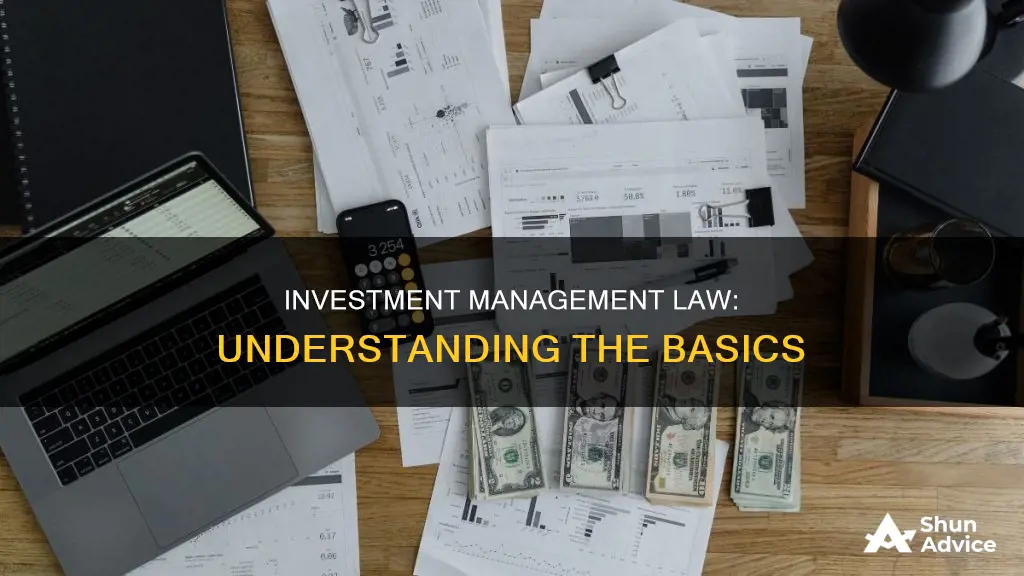
Investment management law is a broad and dynamic area of legal practice that involves guiding and representing investment managers and funds on various legal, regulatory, and compliance issues. Lawyers specialising in investment management provide counsel on fund formation, management, taxation, mergers and acquisitions, and securities enforcement, among other areas. They assist in structuring funds, navigating complex regulatory landscapes, and ensuring compliance with relevant laws and ethical standards. The field encompasses a range of investment vehicles, including mutual funds, hedge funds, private equity funds, and venture capital funds, each with its own unique legal considerations. Given the rapidly evolving nature of the investment management industry, investment management lawyers play a crucial role in helping clients adapt to changing market conditions, new technologies, and increasing regulatory pressures.
| Characteristics | Values |
|---|---|
| Definition | Investment management lawyers help to form investment funds and represent them when they buy and sell investments. |
| Investment Types | Mutual funds, hedge funds, private equity funds, venture capital funds, real estate funds, and exchange-traded funds. |
| Clients | Investment funds, fund managers, financial services firms, institutional investors, independent directors, investment advisers, insurance companies, trust companies, private wealth managers, custodian banks, transfer agents, retirement plan sponsors, and securities lending agents. |
| Services | Fund formation, mergers and acquisitions, regulatory and compliance issues, fund distribution arrangements, tax matters, securities enforcement, and litigation. |
| Industry Dynamics | Rapid pace of change, new investment strategies, shifting demographics, technological disruption, expense trends, and increasing regulatory pressures. |
What You'll Learn

Regulatory and compliance issues
Securities Regulation:
- Investment management lawyers must have a strong understanding of securities laws and regulations, such as the Securities and Exchange Commission (SEC) guidelines and federal and state laws in the US.
- This includes knowledge of the Investment Company Act of 1940 and the Investment Advisers Act of 1940, which govern the regulation of mutual funds and alternative investment vehicles like hedge funds, private equity funds, and exchange-traded funds.
Compliance with Regulatory Agencies:
- Investment funds and their managers must interact with various regulatory agencies, including the SEC and other federal and state financial regulatory agencies.
- These agencies enforce compliance with securities laws, conduct examinations, investigations, and enforcement proceedings, and provide guidance through no-action letters and exemptive applications.
Fund Formation and Structure:
- Regulatory and compliance issues are crucial in the formation and structuring of investment funds.
- Lawyers assist in establishing funds as limited partnerships or other structures, ensuring compliance with relevant laws and regulations.
- This includes advising on fund distribution arrangements, mergers, and restructurings to ensure they meet legal requirements.
Anti-Money Laundering (AML) Compliance:
- Investment management lawyers play a vital role in helping financial institutions comply with anti-money laundering laws and regulations, such as the US Bank Secrecy Act, the US PATRIOT Act, and the regulations of the Financial Crimes Enforcement Network (FinCEN).
- This involves assisting clients in reviewing, drafting, and implementing AML compliance policies, conducting employee training, and establishing and strengthening AML compliance programs.
Broker-Dealer Regulation:
Investment management lawyers provide guidance on broker-dealer regulation and securities trading, including compliance issues related to fixed-income securities, capital markets activities, and market structure and trading regulations.
Global Compliance:
- With the global nature of investment management, lawyers assist clients in navigating the complex landscape of international operations, including establishing local offices and complying with both US and local regulations.
- This involves understanding local tax, labor, employment, and general corporate laws, as well as addressing privacy and confidentiality rules, document delivery requirements, and the enforceability of judgments across jurisdictions.
Tax Compliance:
- Tax compliance is a significant aspect of investment management law, as funds and their managers must navigate various tax laws and regulations.
- This includes understanding the tax implications of different fund structures, cross-border transactions, and global operations.
ERISA Compliance:
- The Employee Retirement Income Security Act (ERISA) is a critical piece of legislation that investment management lawyers must navigate.
- They advise clients on ERISA compliance, including retirement plan offerings, employee benefits, and other related matters.
Industry-Specific Regulations:
- Depending on the industry in which the investment fund operates (e.g., healthcare, technology, or real estate), there may be industry-specific regulatory and compliance issues to consider.
- For example, in the healthcare industry, funds must comply with regulations around privacy and confidentiality of patient data, while in the technology industry, funds may need to address data security and intellectual property regulations.
Risk Management:
- Investment management lawyers assist funds in identifying, assessing, and managing various types of risk, including market risk, liquidity risk, credit risk, and operational risk.
- This involves implementing risk management frameworks, conducting risk assessments, and providing ongoing risk monitoring and mitigation strategies.
In summary, regulatory and compliance issues are at the heart of investment management law, ensuring that funds and their managers operate within the boundaries of the law and protect the interests of investors.
Saving Relationships: Worth the Investment?
You may want to see also

Fund formation and management
Investment management lawyers help form funds, which are pools of money from investors, and help firms negotiate how investors can contribute their money. They also represent the fund when it buys and sells investments.
Law firms such as Robinson Bradshaw, Cooley, Ropes & Gray, and Seward & Kissel have teams of lawyers that focus on fund formation and investment management. These lawyers provide legal services to private investment funds, investment managers, and institutional investors. They represent general partners in the formation of various types of funds, including buyout funds, venture capital funds, hedge funds, and real estate funds.
Lawyers who specialize in fund formation and management advise on fund structuring, regulation, and taxation. They assist in drafting the necessary organizational documents, such as private placement memorandums, partnership agreements, and investor subscription agreements. They also help with the fund-raising process, including preparing offering materials, partnership agreements, and management and compensation arrangements.
In addition to fund formation, these lawyers also provide ongoing fund management services, helping funds and their directors with strategic initiatives and innovative product designs. They also assist with regulatory and compliance issues, fund distribution arrangements, and tax matters.
National Saving Certificates: Smart Investment Strategies
You may want to see also

Taxation
Types of Taxes
Capital Gains Tax
Capital gains tax is levied on the profit made from selling an investment, such as shares. The tax rate depends on the holding period, with long-term investments (over one year) typically subject to lower tax rates than short-term investments.
Dividend Tax
Income earned from dividends is also taxable, and the rate depends on the category. Qualified dividends, which are dividends paid by companies domiciled in the investor's country or a country with a double-taxation treaty, are taxed at a preferential maximum rate. Ordinary dividends are taxed at the taxpayer's income tax rate.
Interest Income Tax
Interest income from investments is generally treated as ordinary income for tax purposes and is subject to the marginal tax rate of the investor. However, there are exceptions, such as interest on bonds issued by municipalities, which may be exempt from federal income tax.
Strategies to Optimise Taxation
Tax-Loss Harvesting
Investors can minimise their capital gains tax liability by strategically realising tax losses. If the value of an investment drops below the cost basis, investors can sell it to realise a capital loss for tax purposes and offset it against capital gains.
Tax-Deferred Accounts
Investing in tax-deferred accounts, such as IRAs or 401(k)s, can help investors reduce their tax burden. Certain investments, like foreign stocks and taxable bond mutual funds, may be more tax-efficient when held in these accounts.
Double Taxation Treaties
International investments may be subject to double taxation, where taxes are paid in both the investor's home country and the country of investment. However, some countries have treaties in place to avoid or reduce this double taxation, benefiting investors.
Role of Investment Management Lawyers
Investment management lawyers play a crucial role in helping clients navigate the complex world of taxation. They advise on fund formation, structuring, and taxation strategies to ensure compliance with regulatory and tax requirements. These lawyers work closely with tax and finance colleagues to provide well-rounded advice to clients.
Goldman's Investment Management: Powering Success and Growth
You may want to see also

Securities enforcement
In the United States, securities enforcement is predominantly undertaken by the Securities and Exchange Commission (SEC), established by the Securities Exchange Act of 1934. The SEC wields extensive regulatory powers, including the authority to register, regulate, and oversee various market participants such as brokerage firms, transfer agents, clearing agencies, and securities exchanges. The SEC also mandates the periodic reporting of information by companies with publicly traded securities, ensuring that investors have access to pertinent financial information.
The SEC's Division of Enforcement plays a pivotal role in securities enforcement by conducting investigations into potential securities law violations, taking enforcement actions against wrongdoers, and seeking to compensate harmed investors. These enforcement actions can range from federal court filings to administrative proceedings, demonstrating the breadth of the SEC's enforcement capabilities.
Additionally, the Financial Industry Regulatory Authority (FINRA), a self-regulatory organization operating under the purview of the SEC, enforces compliance among its members. FINRA is responsible for overseeing brokerage firms, individual brokers, and anyone selling securities to the public as a stockbroker or representative of a broker-dealer. This dual layer of oversight by the SEC and FINRA ensures a robust enforcement framework within the securities industry.
The regulatory landscape governing securities enforcement is complex and dynamic, with various laws and acts in place to protect investors and maintain market integrity. Notable legislation includes the Securities Act of 1933, often referred to as the "truth in securities" law, which mandates the disclosure of critical financial information to investors and prohibits deceit, misrepresentations, and fraud in the sale of securities.
Moreover, the Investment Company Act of 1940 and the Investment Advisers Act of 1940 provide further regulatory frameworks specific to investment companies and investment advisers, respectively. These acts aim to minimize conflicts of interest, enhance transparency, and protect investors in these complex financial arenas.
Life Insurance: An Investment Portfolio Essential?
You may want to see also

Litigation
Investment management law is a legal field that deals with the formation and management of investment funds, regulatory and compliance issues, fund distribution arrangements, mergers and restructurings, taxation, and securities enforcement and litigation. Lawyers in this field often advise clients on fund formation, structuring, regulation, and taxation. They also play a crucial role in negotiating how investors can contribute their money and representing the fund during the buying and selling of investments.
Commercial Litigation
Commercial litigation refers to legal disputes between businesses or individuals involved in commercial activities. In the context of investment management, commercial litigation can arise from various scenarios, including contract disputes, commercial disputes, international arbitration matters, and disputes related to the buying and selling of investments. It often involves substantial financial stakes and sophisticated claimants.
Securities Litigation
Securities litigation pertains to legal disputes involving securities and investment transactions. This can include violations of securities laws, misrepresentations in securities offerings, insider trading, or disputes between investors and investment management firms. Securities litigation aims to enforce securities regulations and protect investors' rights.
Regulatory Compliance Litigation
Investment management firms must adhere to complex regulatory frameworks, such as the Investment Company Act and regulations set by the Securities and Exchange Commission (SEC). Non-compliance with these regulations can result in litigation, often involving regulatory bodies and enforcement actions.
Investor Disputes
Investors may initiate litigation against investment management firms or individual investors for various reasons, including breach of fiduciary duty, misappropriation of funds, or failure to comply with agreed-upon investment strategies. These disputes can be complex and often involve significant financial stakes.
Fund Formation and Management Disputes
Disputes may arise during the formation and management of investment funds. This can include disagreements between fund managers and investors regarding investment strategies, distribution of profits, or violations of fund management agreements. Litigation in this context often involves interpreting complex financial agreements and determining the rights and obligations of the involved parties.
In summary, litigation in investment management law encompasses a diverse range of legal disputes, from commercial and securities litigation to regulatory compliance and investor disputes. The involvement of litigation funding has also added a new dimension to the landscape, enabling claimants to access the necessary financial resources to pursue their legal claims.
Strategically Diversifying Your Investment Portfolio: A Smart Investor's Guide
You may want to see also
Frequently asked questions
Investment management law covers the policy and regulation governing pooled investment vehicles and their managers. This includes the regulation of mutual funds, hedge funds, private equity funds, and exchange-traded funds. Lawyers in this field advise on fund formation, structuring, regulation, and taxation.
Investment management lawyers help to form funds and advise on their structure, regulation, and taxation. They also represent funds when they buy and sell investments, and assist with fund distribution arrangements, mergers, and restructurings.
Key areas of focus include fund formation and management, regulatory and compliance issues, mergers and acquisitions, taxation, and securities enforcement and litigation. Investment management lawyers also advise on anti-money laundering rules and regulations, broker-dealer regulation, and securities trading.







